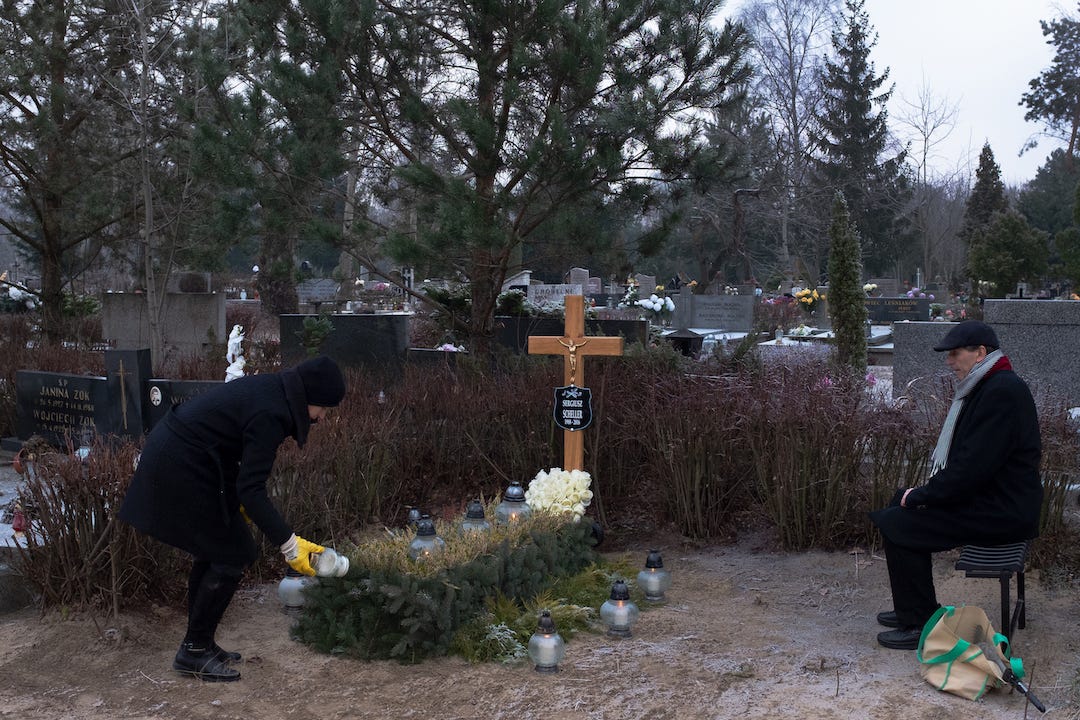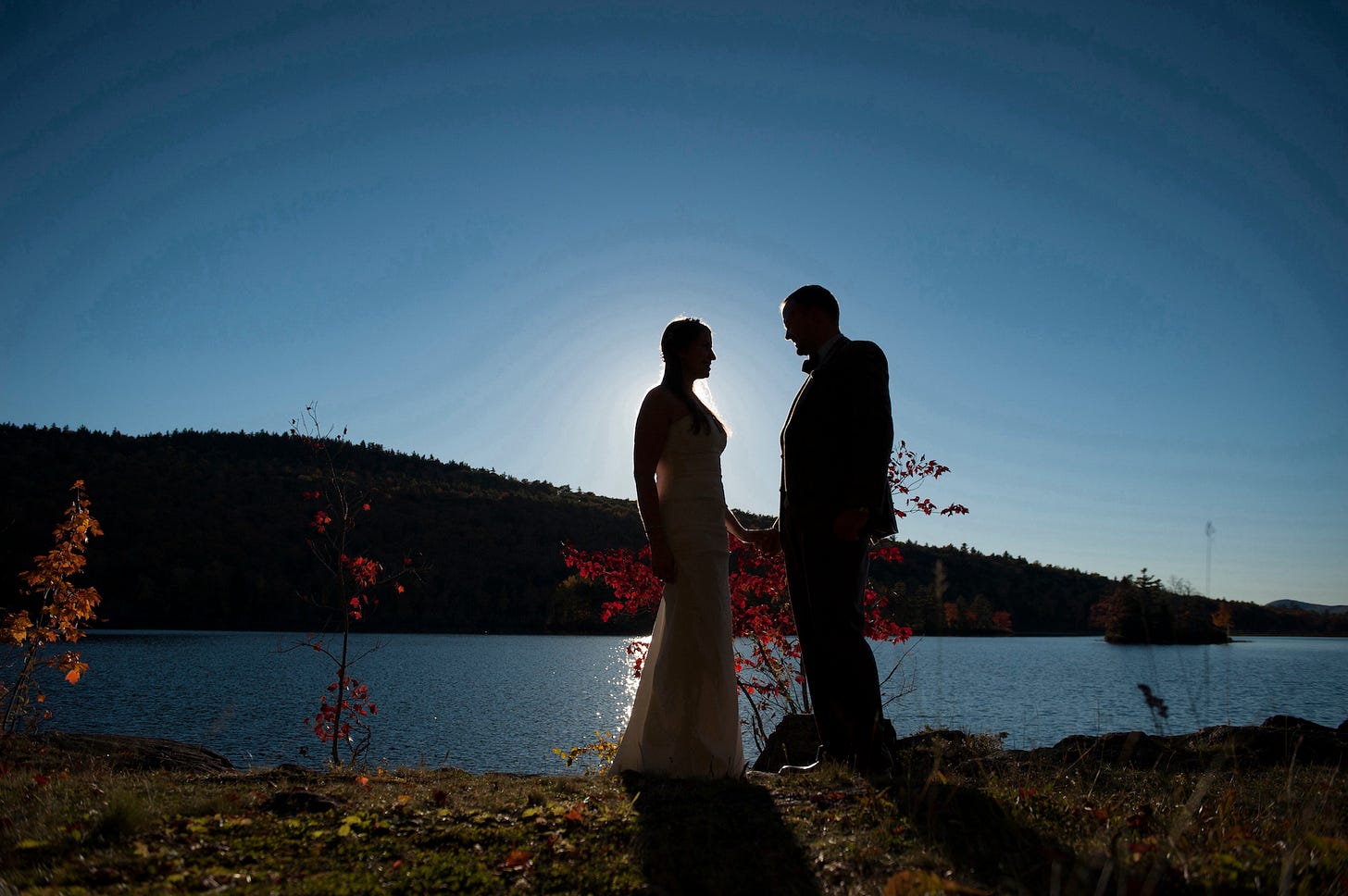There is a tension in grief that can best be described by the popular saying, “look back, but don’t stare.” When you lose someone, staring at your life as it once was is sometimes the only thing that feels comfortable to do. However, there is wisdom to be taken from the idea that staring doesn’t serve us. While the past can look glossy and romantic, the story that surrounds it can become a crippling responsibility to uphold. The past is filled with the angels we love and the ‘if onlys’ we dream about, but if we stay with those mindful wanderings for too long, they can keep the present at a forceful distance. And these days, in the world of social media, the past is with us all the time. It is constantly keeping us company right in our pockets. It is perpetually pinging us with memories. Our devices are demanding us to stare.
I’m of the generation that grew up on Facebook. I joined in 2007 as a high school senior and the following decade would be ruthlessly documented as a result. When I met Sergiusz Scheller, the man who would become my first husband, we were 20-year-old study abroad students in Israel, and Facebook was at its peak. Our early adult years are memorialized in the form of pictures, status updates, messages, and shared links. I know that if I scroll down far enough on either of our walls, I can find evidence of us hanging out on the roofs of the old city in Jerusalem, traveling through Jordan, and political humor contrasting his homeland of Poland with my American identity. Through the timeline, I can track when our stories parted ways in 2010 and when we came back together, this time romantically, in 2014 (there were a lot of music videos with less-than-subtle undertones exchanged around then).
In 2016, Sergiusz (pronounced Sergio) died and I became a 27-year-old widow. It was late September and I will never forget how beautiful the leaves were at that time of year here in New England. A few days after his death, I went onto Facebook and wrote, “It is with a broken heart that I have to share that on Thursday, September 29, Sergiusz - my husband, my soul mate, my best friend - collapsed suddenly and died.”
Our wedding anniversary came quickly after that. It was just a mere 16 days later and would have been our first. So I shared a picture of our quiet wedding ceremony that was officiated in the woods of midcoast Maine. Then came Thanksgiving; that was the holiday he dreamed of when he immigrated to America. His mother celebrated her birthday in early December. Then we had Christmas together in Poland. His father’s birthday was next. And then was my own in late January. Each of those milestone days were shared online triggering a waterfall of sympathy and support.
Facebook can narrate our story from friendship to infatuation to engagement to marriage till death do us part. It tells us where we were, what we looked like, and in some cases, what we felt. It’s like a scrapbook and a gravesite all tied into one.
In the early years of grief, social media served me well. I joined a writing group for grievers in the very first weeks after his death. Every morning I would receive a writing prompt to my inbox and by the afternoon I was posting some new poetry or prose in a private Facebook group. “I am sitting here realizing that I am the keeper of stories,” were the first words I shared. “Sitting in the funeral home, signing the papers allowing for his body to be burned… as his wife, I am the holder of his life.”
It was in that writing group (Refuge in Grief) where I learned how to receive comfort and also how to give it. We were taught how to respond to each other’s grief. We wouldn’t try to fix a feeling or give an opinion. We wouldn’t relate with a story of our own. And we certainly wouldn’t debate. We would simply repeat any words that resonated. Every day on Facebook when I posted in our group, I practiced grieving and holding space for other people’s grief. I still feel as though that group saved my life.
Some months later, I put those tools to use and began a portrait series about young widowhood. I traveled around the country photographing and interviewing other young women who lost their partners. They trusted me with their stories and I did my very best to keep that trust while sharing their pictures on social media. To this day when I scroll through my lists of followers and friends, there is a significant number of names that hark back to this time in my life.

It’s been almost eight years since Sergiusz died and in that near decade I’ve lost too many other people to name. Most have been friends who were older and there was an acceptance of the circle of life in their passing. But others were young and seemingly healthy. I’ve known many more young women to have lost their husbands. I’ve watched their choices in what to share online and their relationship to public grieving, and tried hard to keep in mind the lessons I learned in that writing group.
As the years have passed, I’ve felt a noticeable shift in my own relationship to social media that has been rooted primarily in anger. I’ve been pissed off knowing that Instagram and Facebook mandate a type of grief porn to get your stories seen. When I post something happy, silly or mundane, I get little engagement, but any post about widowhood—stories laden with pain, hurt and sorrow—generates attention. The algorithms have created distance and dissonance and on most days I feel a desperate desire to press delete. It doesn’t seem to serve me and the divisiveness certainly hurts me. Politically, it’s mayhem there. We all know that. But personally, it’s outdated and I realize that there is another truth to confront: grieving has changed me and sharing like I used to no longer feels good.
Facebook has become a statue of what was. I go back to Sergiusz’s Facebook wall and realize that this highly documented chapter of his young adult life (his only adult life) has publicly outlived him. This past June, he would have turned 36 years old and I think about all the opinions he would have outgrown and the perspective he would have gained. I imagine how his style would have changed. He likely would have stopped wearing so many graphic t-shirts, and to his disappointment he probably would have lost most of his hair.

Sergiusz’s page was memorialized in the weeks after his death and to this day I don’t know how Facebook knew. When I decide to visit him there, I stare at the screen in deep discomfort and concern. Will this happen to me one day? If my life abruptly ends, what will be the story of me? I’ve untagged the sloppy pictures from college and on occasion I’ll whittle down the list of friends. But still, it’s a very specific chapter of my life that Facebook keeps present and alive. I often think about the song from Hamilton, “Who Lives, Who Dies, Who Tells Your Story?” I really don’t want it to be Facebook. So, I think it’s time for me to go.
There are things to lose in leaving social media. I’ve learned over the years that if I don’t post on significant days, like his birthday or his death day, our community might not remember. Facebook is the place where I maintain some relationship, albeit a distant one, with those widows that I photographed years ago when we were in the early stage of grief. It is where I have a record of how I felt back then. I read my own old posts and barely recognize the girl I used to be. I see the face of a sad young woman with her cheeks puffed from too much alcohol staring back at me. It’s hard to lose some of that curated sadness because it’s a marker of how far I’ve come.
When Sergiusz died, we split his ashes in two. His parents took half back to Poland and he has a gravestone there. But, it’s not where I like to visit him. We were of different faiths, cultures, religions and languages. His cemetery plot doesn’t give me a sense of solace or comfort. Although I do feel good knowing that his mother, who passed away a couple years ago, is now next to him. Staring at their names engraved in stone feels foreign to me; it’s like I’m a tourist visiting the graves of European ancestors from long ago.

The other half of his ashes stayed with me. They’ve been scattered in a few places, and some remain in my home. They are in-waiting for the next wave of grief that compels me to again say goodbye. In a weird way, I’m looking forward to that day. This quiet place of grief marks a next chapter of my life. I’ve let go of some of the anger and now recognize that while the sharing of my deepest wounds and questions at one point made me feel connected to others, I now feel best protecting them as my own.




Your warmth radiates through your writing ...thank you for your helpful thoughts.
Thank you for your continued growth and sharing these thoughts-and-feelings transitions.